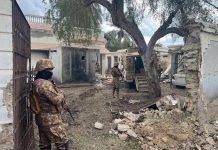Sister of a Baloch missing person has committed suicide in Turbat, reportedly due to depression caused by the disappearance of her brother.
According to The Balochistan Post news desk, Fatima Ishaq, the sister of the missing Imam Ishaq, has committed suicide in Gokdaan, Turbat, on 13 June. Fatima committed suicide due to chronic depression caused by disappearance of her missing brother.
Imam Ishaq, a resident of Turbat, had been allegedly detained by the Pakistani security forces two years ago. Fatima, the mother of three, had supposedly been under chronic depression, a moderate form of depression that can persist for years. It is believed that the trauma caused by disappearance of her missing brother is the underlying cause that led to the development of a suicidal depression.
Fatima Ishaq’s case is not a new phenomenon in Balochistan. In the past, many incidents have surfaced where the family members of the missing persons have succumbed to mental or physical diseases and have passed away. On April 19, Illahi Baksh died after the six-year-long fruitless wait for his missing son Zahid Kurd, the ex-chairperson of Baloch Student Organization-Azad (BSO-Azad).
Two days later, on April 21, the mother of the missing Jan Muhammad breathed her last after the five-year-long wait for her missing son. She continuously visited protest camps and vocalized for her son, but to no avail. Mah Ganj Baloch, the mother of the missing Ghulam Farooq, also departed this life in the same month. Gamar Khan also passed away in the hopeless wait of his missing son Imran Gurgunari’s return.
Countless other families in Balochistan await the returns of their loved ones. Zakir Majeed’s mother has been protesting for the past 11 years for the return of her son; her attempts have not borne any fruit yet. Rashid Hussain’s mother has been in a similar anguish for the past two years for her missing son. Recently, the sister of the missing Hizbullah Qambrani and Hassan Qambrani broke down in a cataract of tears pleading the recovery of her brothers.
These cases are but the tip of the iceberg in Balochistan’s scenario. According to an estimate, 45,000 Baloch and thousands of Pashtuns are missing from Balochistan.






























